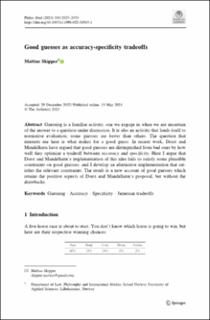Good Guesses as Accuracy-Specificity Tradeoffs
Peer reviewed, Journal article
Published version
Permanent lenke
https://hdl.handle.net/11250/3083311Utgivelsesdato
2023Metadata
Vis full innførselSamlinger
Sammendrag
Guessing is a familiar activity, one we engage in when we are uncertain of the answer to a question under discussion. It is also an activity that lends itself to normative evaluation: some guesses are better than others. The question that interests me here is what makes for a good guess. In recent work, Dorst and Mandelkern have argued that good guesses are distinguished from bad ones by how well they optimize a tradeoff between accuracy and specificity. Here I argue that Dorst and Mandelkern’s implementation of this idea fails to satisfy some plausible constraints on good guesses, and I develop an alternative implementation that satisfies the relevant constraints. The result is a new account of good guesses which retains the positive aspects of Dorst and Mandelkern’s proposal, but without the drawbacks.
Beskrivelse
The Author(s) 2023. This article is licensed under a Creative Commons Attribution 4.0 International License,
which permits use, sharing, adaptation, distribution and reproduction in any medium or format, as long as
you give appropriate credit to the original author(s) and the source, provide a link to the Creative
Commons licence, and indicate if changes were made.

